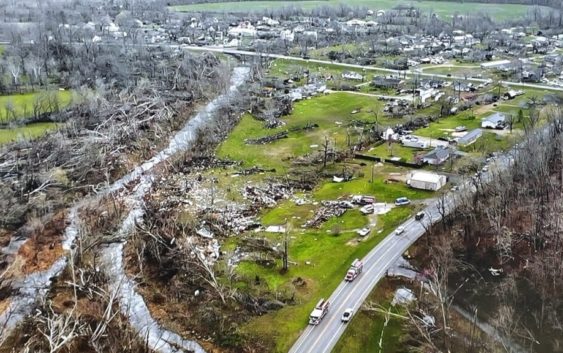- Recovery continues for western NC nearly two months after Hurricane Helene
- Recovery continues for western NC nearly three months after Hurricane Helene
- Cast of Scandal reunites to show support for western North Carolina after Hurricane Helene
- Tropical Storm Sara threatens to bring flash floods and mudslides to Central America
- Hurricane-stricken Tampa Bay Rays to play 2025 season at Yankees' spring training field in Tampa
Missouri tornado kills at least 4 people, causes widespread damage: “It’s just heartbreaking”

(CBS NEWS) — At least four people were killed in southeastern Missouri when a tornado struck the area before dawn Wednesday morning, officials said. Mark Winkler, director of the Cape Girardeau County Office of Emergency Management, told CBS News the deaths occurred in Bollinger County, about 50 miles south of St. Louis.
The tornado moved through the rural area between 3:30 and 4 a.m., said Sgt. Clark Parrott of the Missouri State Highway Patrol. “The damage is pretty widespread. It’s just heartbreaking to see it,” he said.
Parrott said a search and rescue operation is underway that involves multiple agencies. Crews are having to use chainsaws to cutback trees and brush to reach homes.
The highway patrol posted an aerial photo of the damage that showed uprooted trees and homes that had been reduced to rubble.
Justin Gibbs, a National Weather Service meteorologist in Paducah, Kentucky, said the tornado remained on the ground for roughly 15 minutes, traveling an estimated 15-20 miles.
A weather service team was headed to Bollinger County to gather details about the tornado, but Gibbs said it’s clear “it was big. It was a significant tornado.”
Larry Welker, Bollinger County’s public administrator, said the twister traveled along Route 34 into Glen Allen, a village of slightly more than 100 people, and that he hasn’t been able to inspect the damage firsthand because law enforcement were restricting access to the area.
“I’m getting reports that it was pretty bad,” he said.
“There was several trailers there, and I understand that there is still people missing,” Welker said.
The storms moving through the Midwest and South on Wednesday threaten some areas still reeling from a deadly bout of bad weather last weekend. The Storm Prediction Center said up to 40 million people in an area that includes Chicago, Indianapolis, Detroit and Memphis, Tennessee, were at risk from the storms later Wednesday. As of late morning, the greatest threat appeared to be to an area stretching from lower Michigan into Tennessee and Kentucky.
Fierce storms that started last Friday and continued through the weekend spawned deadly tornadoes in 11 states as the system plodded through Arkansas and into the South, Midwest and Northeast.
Schools in Little Rock, Arkansas, canceled Wednesday classes because the storms were expected to move through the area during the morning rush, CBS affiliate KFVS-TV reported.
At least two tornadoes were confirmed Tuesday in Illinois as storms targeted the state and eastern Iowa and southwest Wisconsin before nightfall.
The National Weather Service issued tornado warnings in Iowa and Illinois on Tuesday evening and said a confirmed twister was spotted southwest of Chicago near Bryant, Illinois. Officials said another tornado touched down Tuesday morning in the western Illinois community of Colona. Local news reports showed wind damage to some businesses there.
Earlier Tuesday, strong thunderstorms swept through the Quad Cities area of Iowa and Illinois, with winds up to 90 mph and baseball-sized hail. No injuries were reported, but trees were downed and some businesses were damaged in Moline, Illinois.
Northern Illinois, from Moline to Chicago, saw 75-80 mph winds and hail 2 to 3 inches in diameter Tuesday afternoon, National Weather Service meteorologist Scott Baker said. The agency received reports of semitrucks tipped over by winds in Lee County, about 95 miles west of Chicago.
The same conditions that fueled those storms — an area of low pressure combined with strong southerly winds — were setting up the severe weather Tuesday into early Wednesday, said Ryan Bunker, a meteorologist with the National Weather Center in Norman, Oklahoma.
Those conditions, which typically include dry air from the West going up over the Rockies and crashing into warm, moist air from the Gulf of Mexico, are what make the U.S. so prone to tornadoes and other severe storms.